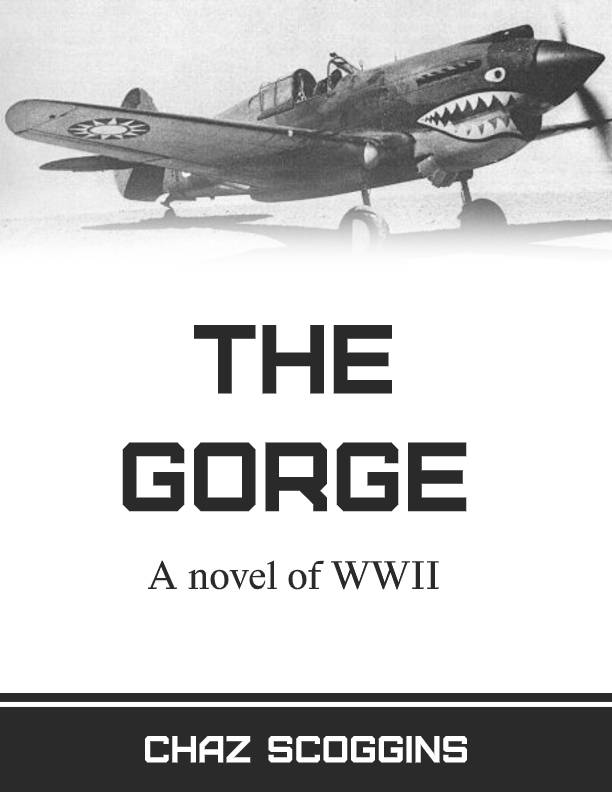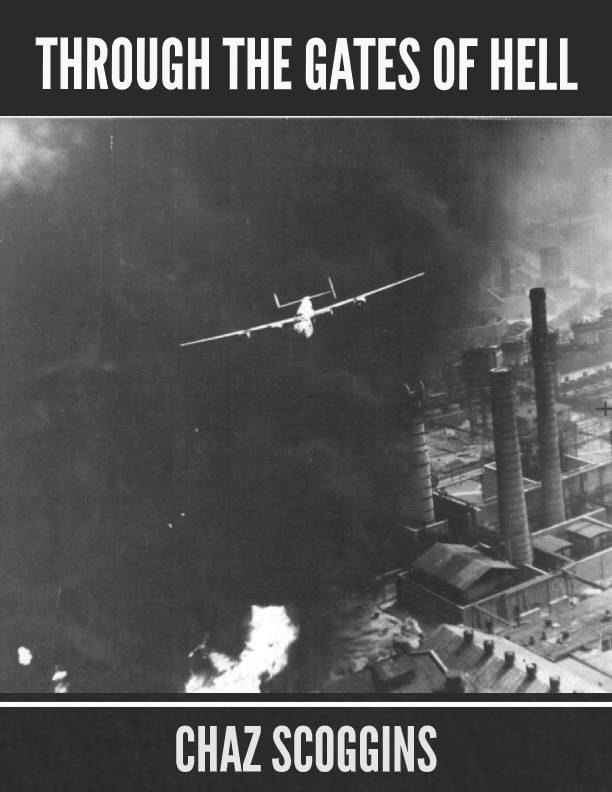BOOK PREVIEWS

THE GORGE
A Preview
It had been a bittersweet Christmas for Claire Chennault. While he was pleased, if still less than wholly satisfied, with their successes in the air and that the exploits of the Flying Tigers were seizing the imagination of the American public, he was saddened to learn that Hong Kong had surrendered and Joe Alsop was missing. The sorely needed replacement tires for the P-40s were on their way from the Philippines, but he regretted having sent Alsop on the mission that perhaps cost him his life.
On the short-wave radios in the hostel bars the pilots listened joyously and animatedly to a 10-minute show on a San Francisco station extolling Third Squadron’s astonishing victories over the vaunted Japanese air force in the skies above Rangoon, amazed that the little battles the Flying Tigers were fighting on the far side of the world had attracted so much attention while massive battles involving hundreds of thousands of soldiers on both sides were being fought in eastern Europe and North Africa. Even Tokyo Rose was singing a different tune now between the American hit records spinning on her nightly show.
“Why won’t you stay and fight?” she demanded to know in her purring voice. “You Flying Tigers are cowards, always running away. Are you afraid of our courageous pilots?”
More than a few of the Adam & Eves and Panda Bears were envious of the action the Hell’s Angels were seeing and the publicity they were getting while the alerts in Kunming had become one false alarm after another.
“Why doesn’t the Old Man send us down there?” Bert Christman wondered. “There’s nothing going on here anymore, and Olson could use the help. We can help even the odds against the Japs.”
“Yeah. We’re just sitting around here twiddling our thumbs,” Socrates Kyricos agreed.
“And knitting our eyebrows,” Christman joked.
JV-44
A Preview
I
January 6, 1945
Sitting alone in the comfortable leather back seat of the Mercedes-Benz, above the purr of the powerful motor Colonel Günther Lützow could hear the frozen snow crunching beneath the rolling tires. The road ahead was deserted, and on both sides the tall pine trees of the dense forest pointed to a moonlit and empty sky. The Tommi bombers had not yet arrived. But Lützow knew they were coming; the British would not pass up such a clear night. At this very moment the citizens of Berlin, the devastated city he had left behind less than a half-hour before, would be bracing for another night of terror from the air.
Out here in the forest it was so peaceful, as if the war were being fought on some other remote continent. Had the Ardennes been this quiet two weeks ago? Lützow wondered. Perhaps an American officer, riding in his jeep, had been thinking the exact same thoughts when all of a sudden the deep Belgian woods around him exploded in deafening noise and deadly fire as the German tanks and infantry materialized out of the shadows. The Allies had dubbed the surprise counter-attack the Battle of the Bulge.
The offensive had failed, just as the more realistic high-ranking officers in the German High Command had predicted it would. But Hitler had planned the attack and demanded it, and his toadies on the Oberkommando des Heeres did not have the courage to try and talk him out of it. Not then. Not now. Not ever. Lützow’s boss in the Luftwaffe, Adolf Galland, the General of the Fighter Arm and at 32 the youngest general in the Third Reich, was one of the very few to have the temerity to stand up to Hitler and his henchmen, and it had cost him his job.
Lützow remembered Galland’s own plan, dubbed the Great Blow, and absently shook his head in dismay. The Oberkommando der Luftwaffe had shot it down faster than an Me-109 flown by an under-trained cadet in his first dogfight.
+ + + + +


GOOFBALL
A Preview
1
The ball struck the bat with a distinctive crack, the kind of sound you only hear when a batter with extraordinary natural power hits it right on the sweet spot.
“There goes another one,” Jimmy Parsons said flatly, not even bothering to look up and watch the flight of the ball disappearing into the distance over the ridge of white phosphate that doubled as the right-field fence.
“Holy shit!” exclaimed Larry Freeman, one of the rookie pitchers standing nearby who had been idly throwing a ball a couple of feet in the air and catching it with the same hand. He held onto the ball when he heard the crack of the bat and looked over his shoulder. “He got all of that one!”
Parsons was plopped down on the rude wooden bench just outside the right-field foul line, attempting to remain upright by leaning against the high chain-link fence that ran parallel to the bench. His cap was pulled down tightly over his eyes, the bill almost touching his nose, and he dozed off from time to time. As the pitching coach of the Boston Clippers, he should have been in the dugout, sitting next to the manager, Roy Harmon, his long-time friend and teammate when both had been playing for the Chicago Cubs two decades earlier. But Parsons had been on a bender the night before, and he thought he’d dry out quicker if he sat in the bullpen and soaked up the sun blazing in the clear blue Florida sky instead of sitting in the shade of the dugout. Harmon didn’t object. It was only a spring training exhibition game after all, and he had spent much of his adult life covering up or overlooking his best friend’s indiscretions.
Through the Gates of Hell
A Preview
13
For nearly four months only a miniscule group of people in the entire world knew about the plans to bomb the Ploesti oil complex in Romania. With the attack now only days away, the time had come to start letting a few others in on the closely held secret. Security was tightened in Benghazi, and, much to the chagrin of the air crews, all personnel found themselves restricted to their bases without being told why.
In the briefing room on July 20 Major General Lewis Brereton and Colonel Jacob Smart addressed the commanders of the five bombardment groups and the handful of carefully selected experienced and trusted pilots who would be flight leaders and deputy flight leaders and lead each of the waves of B-24s over the targets. MPs were stationed outside the room to keep eavesdroppers away from the windows and doors. Smart spoke first.
“A few of you gentlemen know me. Most of you don’t, although you may have seen me coming and going, often at rather odd hours, in and out of the heavily guarded building in Berka 2 that I’ve been told has been dubbed the Greenhouse. For those who don’t know me, allow me to finally introduce myself. I am Colonel Jacob Smart. I graduated from West Point, Class of 1931, and spent nine years as a flying instructor, though, admittedly, in pursuit planes, not bombers. Until a few weeks ago I was in Washington serving as a member of the Air Force Advisory Council and helping General Arnold develop air strategy for winning this war.


THE ORPHANS OF OMEGA
A Preview
FIVE
The sound of distant thunder woke Anke just before dawn, a few short minutes before she would have awakened naturally to prepare for the day’s chores on the Hauser family’s estate in northeastern Poland. Half numb from sleep, she was perplexed by the rumbling and remained beneath the fluffy featherbed stuffed with goose down, savoring its warmth while she waited for her mind to clear. It was early autumn in 1944, too late in the season for thunderstorms. She crawled out from beneath the thick cover, climbed out of her bed, and went to the window. It was just beginning to get light in the eastern sky, and there was not a cloud to be seen.
The distant rumbling persisted. And then she realized what she was hearing was the sound of artillery. After five years the war was coming back to this part of Poland.
Anke wasn’t worried as she shed her nightgown and dressed in her work clothes in the early morning gloom. Armies marching back and forth across Polish soil had been a common occurrence for close to 150 years since the first Hausers had arrived from Prussia and settled on the Orzyc River and for centuries before then. Five years ago the German Wehrmacht had marched through here and captured and occupied nearby Ostrołęka, a small but strategically important and battle-scarred city through which an ancient highway ran from Warsaw to St. Petersburg. Before that the region had been controlled by the Prussians, the French, the Russians, and for brief periods even the Poles themselves. Now the Germans were in charge. It didn’t concern her that the Russians were trying to throw out the Germans. If the Red Army won, the Hausers had lived and thrived under Russian rule before, just as they were living and thriving now under the Nazis.

